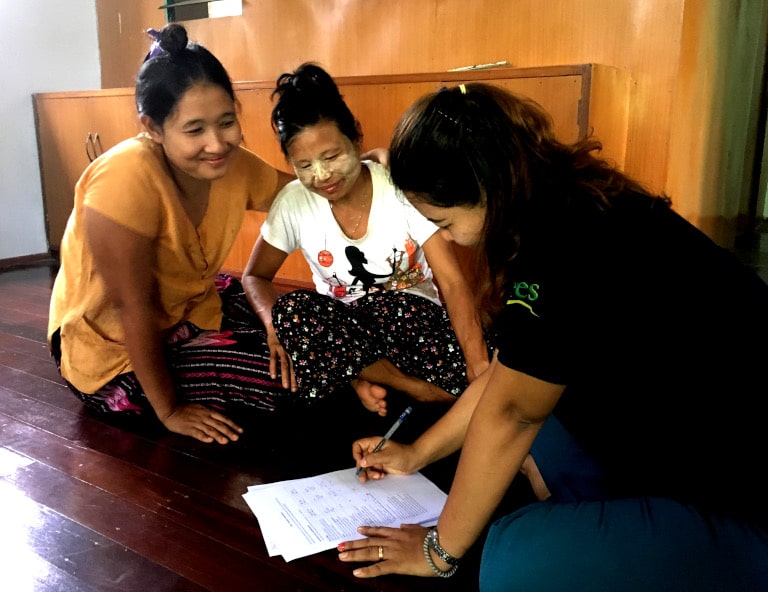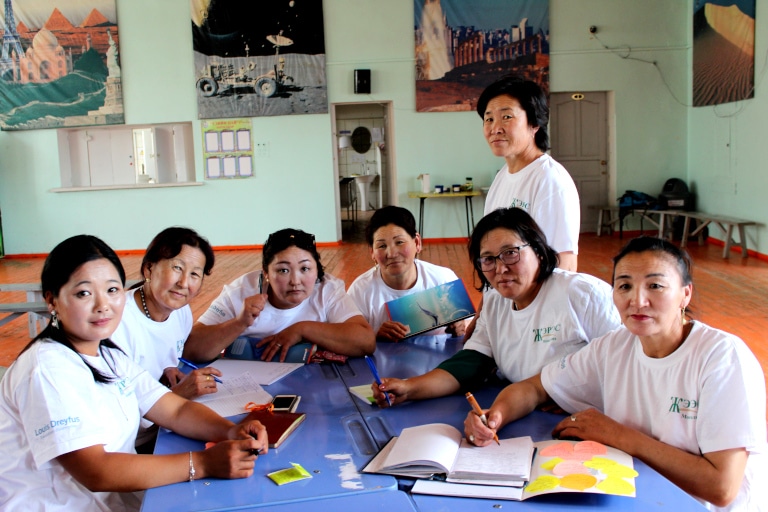Women: from involvement to empowerment
Interview with Marina Dubois, Technical Advisor Community Mobilization and Inclusion at Geres.

What challenges must be met to mainstream gender in our work?
The gender approach means acknowledging that gendered differentiation of attributes, roles and powers results in discrimination in access to education, health and resources. It also means getting across the message that equality of rights and responsibilities and women’s economic and political participation have positive effects for couples, families, communities and countries. There are various stages: gender-specific diagnostics, analysis of the structural causes of inequalities, identifying the specific needs of women and men, preparing an empowerment strategy and, finally, anticipating the impacts on women and men and gender relations.
The approach is complex due to its technical nature: there is no one single response to any particular problem. It is important to develop and look through “gender lenses”, i.e. relying on contextualized information to begin a process of collective thinking about the origins of the inequalities seen and identifying the levers to remedy them. Finding allies amongst influential people within communities and highlighting the contribution and achievements of women are the keys to success.
How do we at Geres tackle these challenges on the ground where gender is a complex dimension?
Vulnerable women and their families have always been the priority beneficiaries of Geres activities. Over the years, their economic potential has been boosted through specific capacity-building activities and access to production equipment in sectors where women had a presence: the manufacture of improved stoves, agro-ecology, vegetable production and processing of farm produce.
Looking for primary contacts to ensure that women are listened to and can take part, our teams in Central Asia were able to bring in women graduates, in Mongolia and Afghanistan for example, where that sends out very strong signals.
En 2014, nous nouIn 2014, we joined forces with Energia, an international gender and sustainable energy network, in an initial approach to mainstream ender within the Myanmar team and its flagship programme on cooking energy, one chance among others to turn the spotlight on women producers (article in English).
These days, we consider the gender approach as a strategic technical and organizational capacity which needs to be strengthened and constantly renewed in all our work and within the framework of our operational partnerships.
Economic empowerment and leadership are two key levers in promoting the energy and societal transition in the territories where we work. Geres therefore strives to analyse and encourage women’s role in the economic development of a sector or territory and bring women into decision-making processes. As part of the support offered to public authorities in producing a climate and energy plan, the teams take care to foster women’s participation in awareness and training activities and ensure that their voice is heard when decisions are taken.

In the Mediterranean area, as of this year, our teams specializing in the fight against energy poverty will endeavour to gain a better understanding of the different challenges faced by women and men when it comes to energy, in order to check the relevance of current responses and undertake specific activities. As another example, piloting the Energy Delivery Model developed by IIED et CAFOD in several countries where Geres works has also helped teams to ask themselves questions about the existing gender relations in their territories, think about ways that these affect our work and how best to take them into consideration to drive positive dynamics leading to an enhancement of our impacts on women and men.
Getting women and men involved in a development process means devising specific strategies as regards mobilization, training and financial engineering taking their particular constraints into account.
That’s the challenge we set ourselves!
If you are interested in the gender dimension of our projects and want to contribute to their development, don’t hesitate to get in touch with the fundraising team.
This interview was conducted by Léa Watine, partnership officer for Geres.
About Marina Dubois
Marina has more than 13 years’ experience in the design, implementation and evaluation of NGO programmes. Over the years, as she gained experience in education, entrepreneurship, protection, health and, since 2014, energy with Geres, she took a keen interest in gender relations. She then undertook dedicated training at the international gender studies and training centre in Brussels to help Geres and its partners take more account of the gender dimension.
The gender approach consists of mobilizing men and women to enable women to realize their potential for the benefit of everyone. The approach developed initially (Women and Development) centred its support on women, essentially building their capacity in order to reduce discrimination against them. These days, interest is also increasingly focused on power relations, increasing the visibility of women’s as well as men’s interests. That’s known as the “Gender and Development” approach, acknowledging that change will only come if both sexes are made aware and mobilized.
WOULD YOU LIKE TO TAKE ACTION
AND SUPPORT WHAT WE DO?
Tell us who you are and find your means of action.
